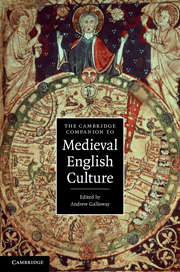Book contents
- Frontmatter
- Introduction
- Part one Theaters of culture: political, legal, material
- 1 From court to nation
- 2 The legal revolution and the discourse of dispute in the twelfth century
- 3 Archaeology and post-Conquest England
- Part two Cultural ideals and cultural conflicts
- Part Three Literacies, languages, and literatures
- Part four Legacies and re-creations
- Guides to further reading
- Index
1 - From court to nation
from Part one - Theaters of culture: political, legal, material
Published online by Cambridge University Press: 28 July 2011
- Frontmatter
- Introduction
- Part one Theaters of culture: political, legal, material
- 1 From court to nation
- 2 The legal revolution and the discourse of dispute in the twelfth century
- 3 Archaeology and post-Conquest England
- Part two Cultural ideals and cultural conflicts
- Part Three Literacies, languages, and literatures
- Part four Legacies and re-creations
- Guides to further reading
- Index
Summary
Throughout the Middle Ages, England was rife with politics: at every level of society individuals and communities waged contests to acquire, exercise, and retain power and authority. Wealthy peasant families dominated village society and used their wealth and prestige to hold sway over their lesser neighbors and maintain their economic grip on the village, while often vying with one another for ascendancy. In towns, oligarchies of wealthy merchants controlled urban courts and offices to protect and further their commercial and property interests, while trying to keep in check the retailers, artisans, and servants who made up the bulk of a town's population. Yet the oligarchs were no less competitive and scrambled among themselves for power and authority. The counties experienced similar levels of competition and conflict, stratified as they were among the wealthy lords whose property stretched across many counties, to knights who held one or more manors and thought of the county as their community, to smaller landholders who might not have had the wealth to break into the ranks of knighthood, but who had a proprietary interest in county affairs and who would in time become the “gentlemen” on whose shoulders the county community would rest. These men served on juries, became local officials, and had the loudest voice in meetings of the county court.
- Type
- Chapter
- Information
- The Cambridge Companion to Medieval English Culture , pp. 15 - 42Publisher: Cambridge University PressPrint publication year: 2011



